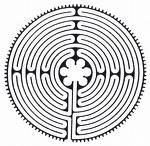Students Can Step Forward As They Follow Early Christian Practice

A practice popular among Catholics in the Middle Ages will make its way to campus on Monday, March 29. University Ministries will offer the labyrinth, an early Christian spiritual tool used for meditation and reflection, in the McIlhenny Ballroom of the DeNaples Center from 11 a.m. to 8 p.m.
The labyrinth takes about 20 to 30 minutes on average and involves praying, meditating and reflecting on your journey through life as you follow a single walking path. It is not a maze. Participants enter at a single point, follow a widening footpath to the center – the half way point – then out again, symbolic of the spiritual journey with God and with others. Participants pace themselves for the walk.
The practice is “used for personal, psychological and spiritual transformation” and is “thought to enhance right-brain activity,” according to The Labyrinth Society, an international group dedicated to support those who create, maintain and use the labyrinth.
Labyrinths, which date back 3,500 years and have appeared on several continents, became popular among Christians in the 12th and 13th centuries. The design was laid into the floors of many Gothic cathedrals built in Europe during that time, including one of the world’s most famous labyrinths in the Chartres Cathedral outside of Paris.
During the Middle Ages, pilgrimages played a significant role in Christianity. As travel to the Holy Land became more dangerous, select cathedrals throughout Europe were designated as pilgrimage locations where Christians would travel to in order to walk the labyrinths cast into the floors of these sites.
There has been a resurgence of labyrinths in the United States over the past two decades. Labyrinths are now being used by religious communities, hospitals, spas and retreat centers, schools, universities, prisons and even businesses.
The labyrinth is being shared with The University of Scranton courtesy of the Covenant Presbyterian Church in Scranton.
For additional information, contact Amy Hoegen, university minister, at 941-5510.






